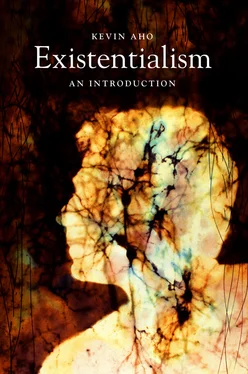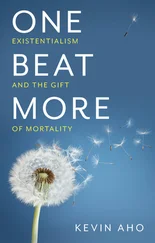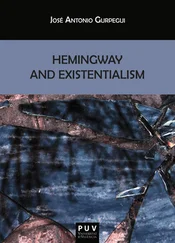Kevin Aho - Existentialism - An Introduction
Здесь есть возможность читать онлайн «Kevin Aho - Existentialism - An Introduction» весь текст электронной книги совершенно бесплатно (целиком полную версию без сокращений). В некоторых случаях можно слушать аудио, скачать через торрент в формате fb2 и присутствует краткое содержание. Год выпуска: 2013, ISBN: 2013, Издательство: Polity, Жанр: Философия, на английском языке. Описание произведения, (предисловие) а так же отзывы посетителей доступны на портале библиотеки ЛибКат.
- Название:Existentialism: An Introduction
- Автор:
- Издательство:Polity
- Жанр:
- Год:2013
- ISBN:978-0745651422
- Рейтинг книги:3 / 5. Голосов: 1
-
Избранное:Добавить в избранное
- Отзывы:
-
Ваша оценка:
- 60
- 1
- 2
- 3
- 4
- 5
Existentialism: An Introduction: краткое содержание, описание и аннотация
Предлагаем к чтению аннотацию, описание, краткое содержание или предисловие (зависит от того, что написал сам автор книги «Existentialism: An Introduction»). Если вы не нашли необходимую информацию о книге — напишите в комментариях, мы постараемся отыскать её.
Existentialism: An Introduction
Existentialism: An Introduction — читать онлайн бесплатно полную книгу (весь текст) целиком
Ниже представлен текст книги, разбитый по страницам. Система сохранения места последней прочитанной страницы, позволяет с удобством читать онлайн бесплатно книгу «Existentialism: An Introduction», без необходимости каждый раз заново искать на чём Вы остановились. Поставьте закладку, и сможете в любой момент перейти на страницу, на которой закончили чтение.
Интервал:
Закладка:
Of all the existentialists, Nietzsche is the most sensitive to how the determinations of one's own physiology limit the possibilities for self-realization. He insists that man “know himself physiologically,” and that “to know, e.g., that one has a nervous system (—but no ‘soul’—) is still the privilege of the best informed” (1968, 229). The suggestion, here, is that our capacity for transcendence is always mediated by the polymorphous drives and affects of the biological body. Whether I am able to freely accept anxiety and death into my life is not necessarily up to me; it is the result of the “fortunate organization” of my nature (705). This is why Nietzsche says: “[Freedom] is for the very few” (1998, 29). It is “a privilege of the strong” (1990, IX 38) who cannot help but confront themselves and accept who they are. Nietzsche understands that some of us are not so strong because we are born with a complex of inherited genes and neurochemistry that sabotages the authentic confrontation with anxiety. “It is simply impossible,” he writes, “that a person would not have his parents’ and forefathers’ qualities and preferences in his body. … If we know something about the parents, then we are allowed a stab at the child. … These things will be passed onto the child as surely as corrupted blood” (1998, 264). Our own genetic vulnerabilities or ‘corrupted blood’ invariably shape our affective response to anxiety and death. Fortified with a particular neurochemistry, confronting the experience may very well be healing, freeing us from neurotic self-deception, and opening up new possibilities for existential growth. But existential therapists need to guard against the tendency to romanticize anxiety. For some patients, there is no breakthrough or transformation. The experience can be so overwhelming that, without some medical intervention, they are destroyed. This helps us to better understand Styron's words when, in the darkest phase of his collapse, he simply asks: “Why wasn't I in a hospital?” (1990, 59).
These cautionary comments are in no way meant to diminish the importance of existential approaches to mental health. In the age of medicalization, there is more need than ever to both situate and understand the patient within his or her own context and to recognize and accept the inescapable pain of being human. By taking a position of scientific detachment and reducing the patient to an object, the therapist invariably overlooks the patient's lived experience and fails to see that ‘maladaptive’ or ‘abnormal’ behavior is, first and foremost, an expression of the patient's way of being-in-the-world. From the existential perspective, the patient does not merely want to be measured and tested for outward signs of a ‘disease.’ More than anything, he or she wants their experience “ to be heard ” (Laing 1960, 31). In this sense, the existential perspective offers a number of important correctives to the prevailing medical model. First, it allows the therapist to suspend objectifying judgments about the patient and the causal nature of mental illness so that they can listen to the patient as a person and enter into their experience as they feel and understand it. Second, it opens up a space for self-criticism in the ‘psy’ professions by critically engaging ‘the world,’ that is, the sociohistorical situation that has made scientific objectification and technique the default setting in modern medicine in the first place. Indeed, there are encouraging signs in recent psychiatric and psychotherapeutic theory that reflect this attitude of self-criticism by drawing directly on the insights of existentialism. They can be found, among other places, in the emergence of the ‘post-psychiatry’ movement inaugurated by Bradley Lewis (2006) and Patrick Bracken and Philip Thomas (2005), in the relational or intersubjective psychoanalysis of Robert Stolorow and George Atwood (1992), and in the social psychiatry of Dan Blazer (2005). Finally, and perhaps most importantly, the existential approach allows for a mutual recognition between therapist and patient; that the deepest forms of psychic suffering do not originate in faulty biochemistry, but emerge out of the structural frailty and insecurity of the human condition itself. In this sense, both therapist and patient are walking the same ground, both having to confront their own anxiety and death on their own terms.
We will return to the role of the therapist and the problem of medicalization in the final chapter as we shift our discussion to existentialism's relevance today. As we will see, approaching the phenomena of health and illness from the perspective of one's own embodied and situated experience rather than from the perspective of scientific detachment has had a deep and wide-ranging impact on healthcare practitioners and has opened up exciting avenues of research in areas such as bioethics, narrative medicine, nursing, gerontology, and palliative care. This, along with other recent developments in feminist and post-colonial theory and critical philosophies of race, as well as in environmental philosophy and comparative thought, demonstrate that existentialism is not a moribund relic from mid-twentieth-century France. It is, rather, a way of thinking that is flourishing in some of the most important areas of contemporary philosophy and social science. It is to these recent developments that we can now turn our attention.
Binswanger, L. (1956). Existential analysis and psychotherapy. In F. Fromm-Reichmann and J. L. Moreno (eds.), Progress in psychotherapy (pp. 144–168). New York: Grune and Stratton.
Laing, R. D. (1960). The divided self: A study of sanity and madness . New York: Penguin Books.
May, R. (1958a). The origins and significance of the existential movement in psychology. In R. May, E. Angel, and H. F. Ellenberger (eds.), Existence: A new dimension in psychiatry and psychology (pp. 3–36). New York: Simon and Schuster.
Yalom, I. (1980). Existential psychotherapy . New York: Basic Books.
9: Existentialism Today
There is no denying that the Golden Age of existentialism has long passed. In the 1950s and 1960s, smoke-filled apartments, cafes, and jazz clubs in France and the United States were buzzing with late-night discussions of ‘ la condition humaine ,’ and an entire generation of young writers, musicians, and intellectuals could be seen carrying around tattered copies of works by Camus, Sartre, and Beauvoir. Articles on the movement appeared regularly in mainstream magazines such as Life, Time, Newsweek, Harper's Bazaar , and the Atlantic Monthly , giving a popular voice to themes of ‘alienation,’ ‘absurdity,’ and ‘death.’ Indeed, the movement became so fetishized that the American fashion magazine Vogue would publish full spreads on Sartre and Beauvoir detailing both their radical ideas and the stylized look of the “French existentialist” (Cotkin 2003, 95). But if the cultural phenomenon has faded, does this mean the core ideas of existentialism are also passé? Was the French postmodernist Jean Baudrillard correct when he said, “We have thrown off that old existential garb. … Who cares about freedom, bad faith, and authenticity today?” (2001, 3; cited in Reynolds and Woodward 2011, 261). In this concluding chapter, I want to challenge this suggestion and argue that the legacy of existentialism is alive and well in current research in the humanities and social sciences.
We have already touched on existentialism's impact on contemporary trends in the philosophy of mind and cognitive science (chapter 3), in dialogical and narrative conceptions of the self in recent Anglophone philosophy (chapter 4), and in current theories and practices in psychiatry and psychotherapy (chapter 8). But there are also new areas in political theory, feminist and post-colonial thought, and critical philosophies of race that are shaped by the ideas of existentialism. And many of the cutting-edge debates in environmental philosophy are informed by existentialism's critique of modern dualisms and the articulation of the self as relational and already bound up in the natural world. This relational ontology has also influenced key developments in comparative philosophy, revealing deep affinities between the existentialist conceptions of suffering, finitude, and selfhood and those found in the Eastern traditions. Finally, existentialism has made a profound and lasting impact on contemporary approaches to healthcare by reframing our interpretations of health and illness, engaging them from the perspective of lived experience rather than from the standpoint of scientific detachment and objectivity. The proceeding discussion will display existentialism's relevance by highlighting some of these contributions and how they have shaped the current intellectual landscape. We begin with an area for which existentialism has long been criticized, namely, politics.
Читать дальшеИнтервал:
Закладка:
Похожие книги на «Existentialism: An Introduction»
Представляем Вашему вниманию похожие книги на «Existentialism: An Introduction» списком для выбора. Мы отобрали схожую по названию и смыслу литературу в надежде предоставить читателям больше вариантов отыскать новые, интересные, ещё непрочитанные произведения.
Обсуждение, отзывы о книге «Existentialism: An Introduction» и просто собственные мнения читателей. Оставьте ваши комментарии, напишите, что Вы думаете о произведении, его смысле или главных героях. Укажите что конкретно понравилось, а что нет, и почему Вы так считаете.












